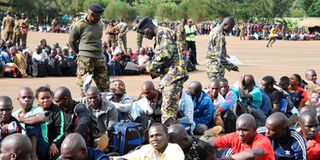Database for college graduates set up in war against fake papers

Military officers verify calling letters, identification documents and academic papers at the Recruits Training School in Eldoret, last year. College administrators said several youths with fake documents were arrested and called on the public to be wary of conmen.
The government has established a database that will help address the menace of fake academic certificates.
The Kenya National Learners Records Database (KNLRD) will contain names of graduates and their universities or colleges.
It can be used to search and confirm if one attended a particular institution of higher learning.
Universities and other qualification-awarding institutions are required to register themselves, their courses, qualifications and learners (graduates) in the system.
Kenya National Qualifications Authority Council chairman Kilemi Mwiria said KNLRD will be used to manage students’ data under the National Qualifications Information Management System (Naqims).
Qualification
“This automated system is intended to be a one-stop shop for qualification-awarding institutions and the degrees or certificates they offer. It shall serve as a national database of graduates for ease of credential verification,” Dr Mwiria said.
The system is the first of its kind in east and central Africa and will hold the key to tracking crucial information for human resource development in Kenya.
Dr Mwiria said it would help in government research and decision-making in terms of academia and labour market supply.
It will also be used for tracking paths of individual learners and providing them and their employers with proof of qualifications.
“Learners can verify their qualifications on the KNLRD, government agencies as well as potential employers. Employment agencies will be able to verify the qualifications of potential staff,” Dr Mwiria said.
When verifying their own information, a learner will receive certification records.
The system will allow clients and organisations to verify information of a third party by keying in the individual’s institution of study and certificate serial number, he said.
“The KNLRD response will be the serial number and details of a particular qualification only,” Dr Mwiria added.
He said the system will provide in-depth data of graduates in a specific programme.
Kenya does not have concrete data on graduates.
State Department for Vocational and Technical Training Principal Secretary Margaret Mwakima said the system will be a trusted central source for nationally recognised qualification-awarding institutions, the qualifications they are authorised to award and the learners who graduate.
“Among the challenges we face as a country is poor documentation of who has been awarded which qualification. This includes a database of how many people have which qualifications,” the PS said.
Dr Mwakima added that the KNLRD system has come at the right time as it will automate verification of student qualifications automatically.
KNQA Director-General Juma Mukhwana said a centralised database is significant because fake qualification has been a big problem in Kenya in recent years.
According to Dr Mukhwana, a third of Kenyans have fake academic certificates.
“The system will also be used to document the number students with international certificates and their qualifications,” he said





